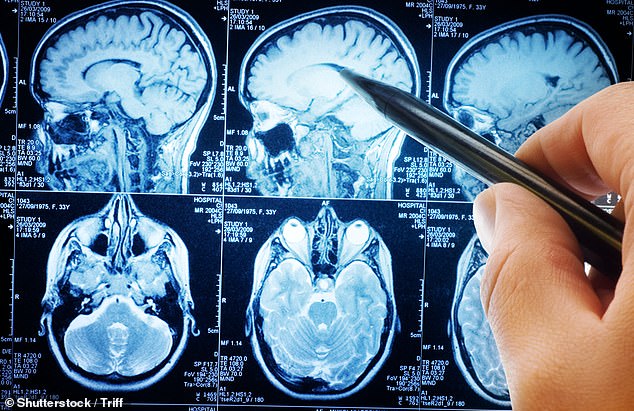Experimental therapy fights untreatable brain cancer with genetically modified HERPES virus
- Researchers in Massachusetts are testing the therapy called CAN-3110
- The treatment is injected into the tumor to provoke an immune response
- READ MORE: FDA Approves $12,000 Cancer Treatment That Uses SOUND Waves
The virus that causes cold sores and genital herpes could be used to fight one of the deadliest forms of brain cancer.
Researchers at Brigham and Women’s Hospital in Boston, Massachusetts found that the herpes simplex virus can cause a response in the body that would trigger a person’s immune system to attack brain cancer cells.
The treatment, called CAN-3110, has been adapted to ensure that healthy cells are not killed.
Ennio Chiocca, chairman of the department of neurosurgery at Brigham and Women’s Hospital, said Gizmodo: ‘Unlike other therapies to date, we have been able to demonstrate that a single administration of CAN-3110 at a given time is enough to activate the patient’s own immune cells to fight and fight the cancer, and we show that this is related to survival responses.”

The researchers found that even in patients with existing antibodies to herpes, the treatment boosted the immune system’s response to the brain cancer.
Brain cancer is very difficult to treat; More than 84,000 people are diagnosed with a primary brain tumor every year. The most commonly diagnosed form, glioblastoma (GBM), is one of the deadliest types of cancer, and the form that killed John McCain and President Joe Biden’s son, Beau Biden.
Traditional cancer treatments such as chemotherapy and radiation often cannot rid the body of all cancer and GBM is considered incurable, with an average survival time of about eight months.
Dr. Chiocca explained that GBM can escape the body’s own immune cells, which try to fight the tumor.
In the laboratory, his team developed a tumor-selective biological agent based on the cold sore virus.
The idea is that this can be injected into GBM patients to ‘reshape’ the GBM so that it is less able to suppress the patient’s immune cells.
The treatment contains a gene called ICP34.5 that helps the herpes virus cause illness in humans through cold sores or genital herpes.
The researchers believe that this gene is the key to triggering a sufficiently strong immune response against brain cancer cells.
In a phase I study published in Naturethe team gave 41 patients with recurrent GBM a single dose of CAN-3110.
The main goal of phase I trials is to confirm that the drug is safe and well tolerated.
Two patients did have an attack, which was possibly related to the medication.
About two-thirds of the participants already had antibodies against the herpes virus due to previous infections.
The researchers found that even in patients with existing antibodies, the treatment boosted the immune system’s response to the cancer.
They did this by measuring the number of T cells, a type of white blood cell, that had increased.
The median survival rate for this antibody group was about 14 months, while those without previous exposure to herpes had a survival rate of eight months – the average survival rate for GBM.
More studies are needed to determine whether CAN-3110 could be an effective treatment for brain cancer, especially in people without existing herpes antibodies.
The team is now working on a study to give patients multiple doses of the treatment over four months.
